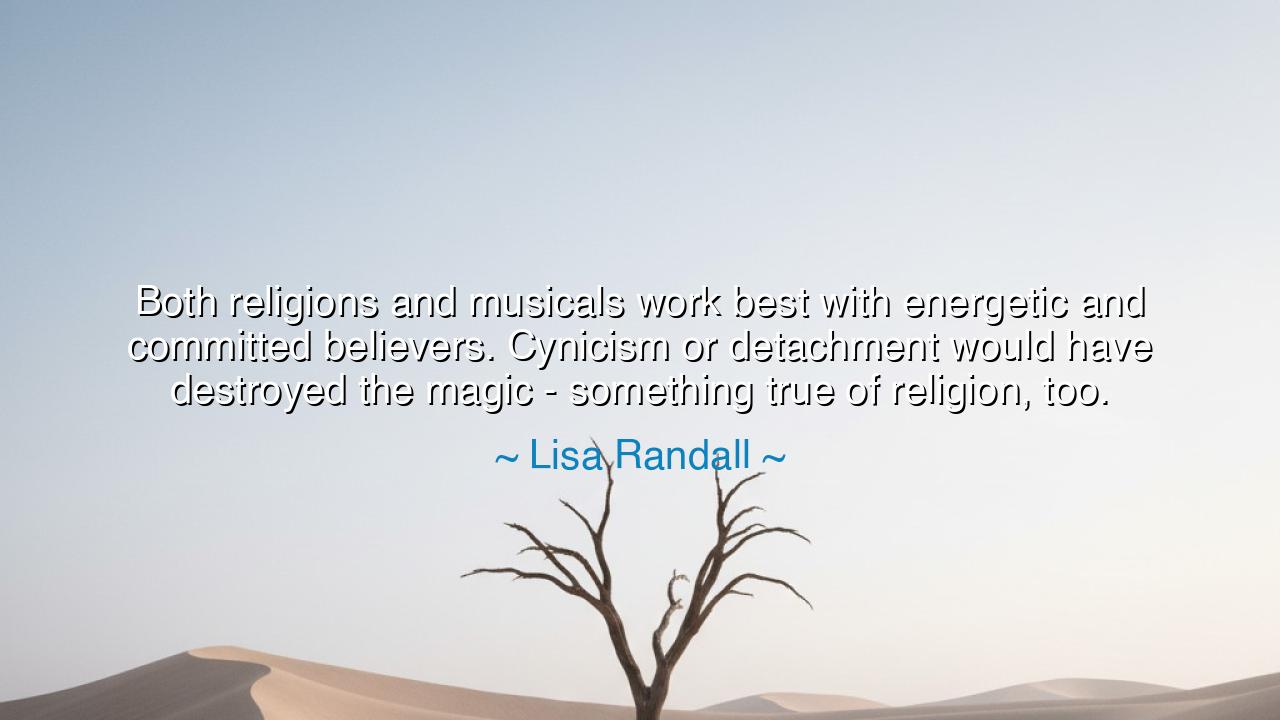
Both religions and musicals work best with energetic and
Both religions and musicals work best with energetic and committed believers. Cynicism or detachment would have destroyed the magic - something true of religion, too.






"Both religions and musicals work best with energetic and committed believers. Cynicism or detachment would have destroyed the magic - something true of religion, too." These words by Lisa Randall offer an insightful reflection on the transformative power of both religion and musicals—two very different arenas, yet united by the profound need for energy, commitment, and belief. What Randall is suggesting is that both religious devotion and the theatrical experience of a musical demand a level of engagement and passion from their participants in order for them to achieve their full potential. Without belief in the magic they offer, whether spiritual or artistic, both can fall into the realm of mere performance and lose their power to inspire, heal, or uplift.
In the ancient world, this principle was known by those who practiced religion with devotion. Rituals were not simply actions performed without thought, but deeply symbolic acts filled with energy and purpose. The great priests and philosophers understood that belief was the life force of any practice, whether in worship or in the pursuit of truth. In ancient Greece, for example, the Delphic Oracle was a place of immense spiritual significance. Those who sought answers were not there to approach the gods with doubt or hesitation. They came with faith, believing that through divine insight, they could change the course of their lives. Faith in the rituals and ceremonies was what allowed them to experience the magic of the divine.
Randall’s comparison between religion and musicals taps into a profound truth: both need a kind of sacred devotion to come alive. Consider the musicals that have defined cultures and cities—such as "Les Misérables" or "The Lion King". These productions are not merely about singing and dancing; they are about collective participation—the audience, the performers, and the creators, all contributing their energy to the story. Cynicism or detachment from these performances would deflate the passion of the experience. A musical thrives on the belief that the magic within the show can reach deep into the soul and evoke strong emotion—this energy is not just for the actors, but for the audience as well. Without this commitment from everyone involved, the performance loses its ability to stir hearts or leave lasting impressions.
In religion, too, this same truth applies. Faith—the energetic commitment to the practices, beliefs, and rituals of a religion—is what allows a person to transcend the mundane aspects of life and experience something profound. When a believer approaches worship with detachment or cynicism, they cannot experience the spiritual magic that comes with deep faith. Saint Augustine famously wrote about the transformative power of belief in God, describing how faith brought him a sense of purpose and redemption. Without the devotion and belief that fueled his spiritual journey, the grace he encountered would not have had the same transformative power. Religion, like a musical, depends on the energy and commitment of the believer to unlock its deeper meaning.
Consider the lives of those who have devoted themselves to both religion and art. Mother Teresa, the revered figure in the Catholic Church, showed the world how energetic faith can change the lives of the most destitute. Her belief in serving others was not just an act of charity—it was an act of love and devotion that required the energy and commitment to continue even in the face of overwhelming adversity. She was not just performing good deeds; she was living her faith with every act. Her life became an embodiment of the idea that the magic of religion is found in the energy and dedication of those who believe deeply in their calling.
Likewise, consider the story of Lin-Manuel Miranda, the creator of "Hamilton", whose energy and passion for telling the story of the founding fathers transformed the world of theater. He infused his work with a level of belief that transcended the page and ignited audiences around the world. In this case, belief in the power of music, theater, and history created something truly transformative. The musical’s magic—its ability to teach, entertain, and inspire—depended not just on the actors’ performances but on the audiences’ willingness to believe in the story being told. Cynicism would have destroyed the magic, leaving only a cold, empty performance.
Thus, the lesson here is clear: both religion and art—whether it be a musical, a painting, or any form of creative expression—require belief, commitment, and engagement to reach their full potential. The power of these things is found not in their external forms but in the energy and passion that we bring to them. Cynicism, which is the antithesis of belief, weakens the power of both religion and art. In our own lives, we must strive to approach our beliefs—whether spiritual or creative—with commitment and enthusiasm. By doing so, we can experience the magic that comes with engaging fully in life and allow the transformative power of our faith and creativity to make a difference in the world.
Let us reflect on how we approach our daily lives and the practices and beliefs that define us. Are we fully engaged in them, or do we approach them with detachment or indifference? Whether in our religion, our art, or our work, let us give ourselves to the process with energy, commitment, and believing hearts, so that we may discover the profound magic that lies in all things when approached with full faith.






AAdministratorAdministrator
Welcome, honored guests. Please leave a comment, we will respond soon